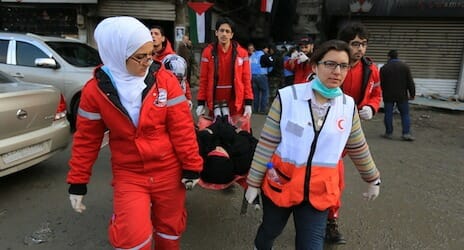By Viviane Tou’meh, SARC
The offices at the headquarters of the Syrian Arab Red Crescent (SARC) have been a hive of activity over recent days as teams prepared to take more aid to the Berzeh area, and first aid squads in al-Zahera operation centre prepared themselves for mission to the Yarmouk camp.
The society has mounted eight successful operations to evacuate people from the Yarmouk camp, but the last three attempts failed. Mahmoud Qweder, a volunteer from the first aid squads who was involved in these missions, said the operation involved much more than just first aid. “We transferred people from Yarmouk camp and tried to assist them to get in contact with their relatives outside the camp, while the sick we transferred them to hospitals,” he said.
Qweder said that people inside the camp are exhausted and many are desperate to make contact with friends and family who have moved on. “When they find a relative, they forget everything; the hunger, sickness and even the pain.”
Beyond their first aid skills and immediate relief, SARC volunteers also bring solidarity and goodwill to their missions, which can be vital for the psychological well-being of those living in difficult circumstances.
Volunteer Hamsa Melhem, who was involved in the recent evacuation process wrote on her Facebook page about some of the people she met during the operation: ‘I do not know if I have the right to talk about this Grandmmam,” she wrote. “She is Palestinian and was born in 1927. When she was asked if she was feeling afraid while she was in Yarmouk camp she answered: “Yuma, this is my home.”’ Melhem also said she encountered children who had lost their hair due to malnutrition and said that food security was a major problem for many families.
Mahmoud has been a volunteer with SARC for 14 months and is now used to extremely dangerous missions. Last year he was trapped for five hours with his colleagues in Berzeh, while they were evacuating people during a fire fight.
Yarmouk camp, in a suburb just south of Damascus city, was home to over 160,000 Palestinian refugees. In December 2012 and in the months since, armed conflict has caused at least 140,000 refugees to flee their homes in Yarmouk. Between December 2012 and June 2013, civilians could still access UNRWA assistance at the Zahera entrance to Yarmouk.
However, food ran out in Yarmouk months ago, and trapped people there have faced starvation since mid-July 2013.
According to recent reports, food shortages have led to malnutrition, mis-carriages and a number of deaths, including infants. However, the situation in Yarmouk is spreading and people all over the country are running out of supplies and having difficulty accessing basic services and healthcare.
In December 2013, UNRWA Commissioner-General Filippo Grandi said in a statement that the situation in Yarmouk was becoming desperate. “Since September 2013 we have been unable to enter the area to deliver desperately needed relief support.” In January 2013, the UN estimated that one million people needed urgent humanitarian assistance. 12 months later, the figure is nearly ten million.
Among the Syrian towns under siege at this time are Nubul and Al-Zahraa in Aleppo province, the old city of Homs, and the towns of Eastern Ghouta, Daraya.
First aid teams at the Damascus branch reported that 1,256 people were evacuated from Yarmouk camp on the 6 February, and today they continue with new evacuation operation with the continuing cooperation from the Palestinian Red Crescent and the United Nations Relief and Works Agency for Palestine Refugees in the Near East (UNRWA).
Update: Homs
Well-publicised operations in Homs have taken vital relief supplies into the city with the support of IOM, UNICEF, WFP and UNHCR. In addition 80 people were evacuated from the city under the protection of the Red Crescent. An aid convoy loaded with 250 food parcels, medicines for chronic diseases, 190 hygiene kits, 30 boxes of water purification materials, box of peanut butter and 500 floor bags made it into the old city of Homs on the 8 February.
Unfortunately vehicles clearly showing the red crescent emblem were fired upon and one volunteer was injured.
“Given the extremely difficult conditions prevailing in Syria today – especially in towns like Homs – it is absolutely vital for all parties to the conflict to facilitate the work of all humanitarian and healthcare personnel,” said Abdul Rahman al-Attar, president of SARC. “They must respect the Red Crescent and Red Cross emblems displayed on tents, buildings, vehicles and clothing and spare those bearing them.”


Discussion about this post